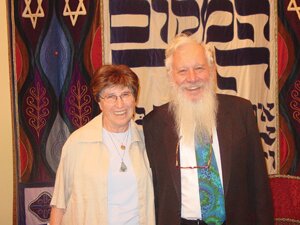| Dr. Robert J. Aumann, 2005 Nobel Prize laureate |

|

|
|
Many people who accomplish great things in life have stories from their youth of people who vowed they’d never amount to much. Robert J. Aumann may be the only Nobel Prize Laureate in Economics to have been told by a high school guidance counselor to consider a career as an auto mechanic instead of academia. Dr. Aumann was born in Frankfurt, Germany in 1930, and moved with his family to the US in 1938. He holds degrees in Mathematics from City College, New York, and MIT. He made aliyah in 1956. He was awarded the Nobel Prize for Economics for “having enhanced our understanding of conflict and cooperation through game-theory analysis.” When asked by a 12-year-old to define game theory, Dr. Aumann defined game theory as describing the strategic decisions made by any two entities when engaged in an interaction in which they have different goals. But Dr. Aumann apologised for not being a “practical” economist. “We were in Shanghai with a wonderful man, Robert Mundel, the 1999 Nobel winner for economics. He is a practical economist. When they asked him how Shanghai could become the financial centre of the world, he could tell them. I couldn’t tell them.”
Dr. Aumann discussed on a topic from the Talmud that he used game theory to help explain. He prefaced his discussion with a gently self-deprecating “I’m not a talmid chocham.” He went on to explain “this explanation works well for 22 of the 23 instances in the Talmud of this problem. The 23rd… it doesn’t explain so well.” Must of us who are not Talmudic scholars would be overjoyed to have our theory apply successfully to only one instance. For a mathematical proof to be accepted, though, it must apply to all instances of the problem. As part of his answer to a question on the shiur, Dr. Aumann remarked, “That’s the great thing about Judaism. We police ourselves. For example, several years ago, I needed some software. It cost $700. Now that’s a lot of money, and of course, many people simply copy software if they need it, at least they used to do this in Israel, I don’t know about Hong Kong.” At this point, the laughter from the crowd gave him his answer. So he said, of course you must pay for the software.” How is one informed he’s won the Nobel Prize? “They called me in my office. They said ‘The Swedish Academy has just voted to award you the Nobel Prize for Economics. We will be making the announcement in twenty minutes. You might want to take your phone off the hook.’ They called me at twenty minutes to one in Israel, and they made the announcement at noon in Sweden. I took my phone off the hook. Pretty soon people started to bang on my door.” Was Dr. Aumann aware that he was being considered for the prize? “Well, you know, in the early 90’s, I had an idea they might be looking at game theory. But then they gave the prize to John Nash, and I thought, well, that was the prize for game theory. When Abraham Lincoln was being considered for the presidential candidacy of the Republican Party; in those days, you didn’t go out and seek it. People got together and approached someone. But Lincoln was later asked, did he know he was being considered, and did he want them to choose him. He said, ‘I had a taste of it.’ So that was how I felt in the 90’s: I had a taste of it.” Over the course of his career, Dr. Aumann has been associated with most of the important university research faculties in the world. One night, at the University of California at Berkeley in the early 1970’s; “I got a phone call at 1:00 a.m. ‘Professor Aumann, I need to speak with you.’ He came over, and I said, ‘OK, what can I do for you?’ And he said he was completely tied up with a question about the seven miraculous things that were created at twilight before the first Shabbat. He was filled with doubt about the tongs; the famous tongs without which nothing else can be made, not even other tongs. But he says to me, ‘I don’t understand why the tongs had to be miraculous. You can make something unrefined from a stone; and then each successive invention is more refined. Why must the tongs be created miraculously?’ “So I thought for awhile and then I said, ‘Not all authorities agree that tongs were part of this miracle.’ And he listened and seemed satisfied, and thanked me and went home. In the end I was glad he’d come, even at that hour. If I hadn’t been able to give him a satisfactory answer, maybe he would have completely lost his faith, and not gotten up and put on tefillin in the morning.” Batya Aumann is also from a German refugee family, having fled in 1933. So many families waited too long to leave, how did the ones who escaped in time know when it was the “right time”? Mrs. Aumann told a story about her father, a doctor, later to become chief of staff at Shaare Tzedek Hospital in Jerusalem. He didn’t want his children to have to live with the changes that began when Hitler gained power. But what convinced him was a visit one day to his surgery by a group of Nazi officials demanding to see his patient records. He refused, citing patient confidentiality, insisting that he showed those records to no one. The Nazis insisted. The question of knowing when was the “right time to leave” surfaced in a story Dr. Aumann told about his stint with the Rand Corporation, as a consultant, shortly after Israel’s spectacular victory in the 1967 Six-Day War. “One of the generals there leaned over to me and said, ‘We knew you’d be victorious.’ I said, ‘It’s nice that you knew. We certainly didn’t know.’” It was a reminder that during that time, in Israel, victory was by no means a forgone conclusion. What was the most meaningful about the actual Nobel ceremony? “Two things. First, seeing the flag of Israel up with all the other flags. The Swedish flag was in the middle, and right next to it the Israeli flag. That was wonderful. The second thing is this watch.” The inscription is in Hebrew, but in English it is this: All the families on earth will be blessed through you and your offspring. (Genesis 28:14) |

















